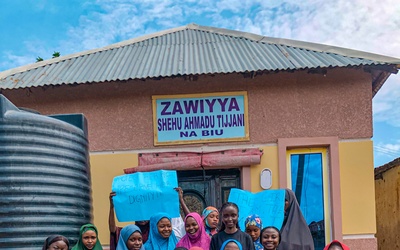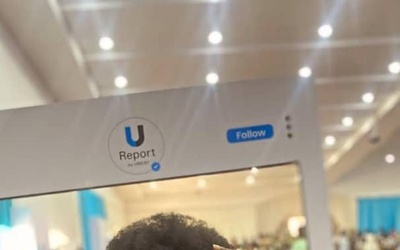When the first positive case of Ebola was reported in Sierra Leone some seven months ago, it was terrifying for everybody. Sierra Leoneans were afraid it could be transmitted by air and started believing all sorts of rumours about how to boost their immunity and bathed with salt water. Little did we know then that, Ebola can be transmitted through human-to-human transmission via direct contact (through broken skin or mucous membranes) with the blood, secretions, organs or other bodily fluids of infected people, and with surfaces and materials (e.g. bedding, clothing) contaminated with these fluids.
The current Ebola outbreak, which has infected over 20,000 people worldwide, has killed over 8,000 - 2,802 of whom are Sierra Leoneans. It remains the most severe and complex disease the world has seen in 40 years of combating an outbreak. However, the world has taken significant steps in the right direction by sending military doctors, nurses and support staff to Sierra Leone and other affected countries worse hit by the virus. It is also donated $1 billion to 10 humanitarian organizations tending the sick in the affected countries. Extraordinary precautions and perseverance to contain, defeat, and prevent its spread to other parts of the world is still required. This is a task that must be accomplished, a victory that must be won.
However, beating the virus remains what we have been grappling with due to the lack of trust in the authorities, a belief the outbreak wasn't real, language barriers and cultural differences in dealing with illness and death.
The first step towards winning the war is by breaking the chain of transmission alongside effective communication and massive awareness campaign, as the spread of Ebola is solely tied to these factors. President Koroma recently acknowledged that Ebola can only be defeated when the chain of transmission is broken. He went further to urge all to continue with social mobilization in their various communities so that the locals within the communities will stop washing corpses, burying the deceased at night and desist from traditional practices that will accelerate the rate of infection of the spreading virus.
Less than 10 years ago Angola was suffering from an outbreak of Polio. Cases were increasing annually, and Angola was exporting the virus to neighboring countries. For more than three years running now, Angola has seen no new cases. The national polio campaign includes active surveillance of infections, cross-country vaccine transportation and routine door-to-door vaccinations in high-risk areas. Africare, World Vision, Catholic Relief Services and the Salvation Army, under the strong leadership of the Government of Angola, have trained thousands of Angolans to perform all these necessary functions and encourage healthy behaviors in communities that are keeping the country safe from polio.
Benin had a serious malaria problem. One reason is that millions live too far from health facilities. In 2004, Africare started a small local project, trying something new. Rather than bring remote communities to facilities for care, or bring facilities closer to communities, Africare trained communities to be their own healthcare providers - training women's groups to prevent, recognize and treat malaria. By 2008 the malaria incidence in the project area had dropped 73 percent, despite increasing nationally by 65 percent. This program has since been scaled up nationwide. Using the same community-based model, Africare has worked closely with the Ministry of Health to help Benin achieve universal coverage of long-lasting, insecticide-treated bed nets and encourage healthy habits in communities to control malaria.
In Senegal, the Ministry of Health adapted a novel public health messaging platform designed to educate people ABOUT DIABETES after the confirmation of the country first's and only case of Ebola. As a result, four million SMS messages were sent to the public warning of the dangers of the disease. And it worked - the virus was stopped in its tracks and the World Health Organization pointed to effective communications when explaining why Senegal succeeded in stamping out Ebola.
In Nigeria, a system called UReport was praised for de-bunking myths about Ebola. Developed by UNICEF, the technology allows citizens to ask questions and get replies in real-time. The added feature is that user's can re-broadcast those answers to friends and relatives via SMS. According to Aboubacar Kampo, UNICEF Nigeria's chief of health, the free tool saw the number of subscribers double within first 24 hours of the Ebola outbreak, because of the accuracy of information available on the platform.
In Liberia, a text-message system aimed at health workers on the frontline is also gaining traction. Launched by the country's Ministry of Health and UNICEF, mHero (Mobile Health Worker Ebola Response and Outreach) connects the ministry and health workers in real time by broadcasting messages about care and prevention. The platform also lets health workers know when their hazard pay is available as well as the status of dead bodies in communities.
Liberia also went on to implement more creative education campaigns. Health officials teamed up with local musicians to create a catchy way of highlighting the risks of Ebola in a country where roughly half of the population is under 18. Over the thumping techno beat, the chorus runs: "Ebola is real, it is time to protect yourself, Ebola is real, protect your family".
Funding is key to the growth of messaging platforms and mass public health programmes geared towards stemming the tide. Donor and Development partners, African business leaders and world leaders must come together again and commit more funds and logistical support towards defeating the virus. The fund should be used to support social mobilizers and front line workers. The funding should also be part of a long-term roadmap for post-Ebola Sierra Leone.
While the international community has built and staff up treatment centers, we need to ensure that families and communities have what it takes to respectfully care for their sick and dying family members. We need to ensure that families can do so while reducing their own risks of becoming infected. We need to make efforts to stop the virus from further entering into communities by breaking the chain of transmission. We need to train up the hundreds of already involved Community Health Care Workers to go into households in a safe manner and teach family members how to safely and lovingly care for their families.
Nevertheless, all the calls for more international action are most welcome. But we cannot forget that ultimately, it is not the donor partners, world leaders or experimental drug companies that will overcome the disease. It will be us who will win this war on the ground. As Sierra Leoneans, we need to break the mentality that responding to crises in our country is the mandate of the international community, the onus lies squarely on us to win this war, in like manner Polio was defeated by Angolans and Malaria by the Beniniose.
By Gabriel Benjam








